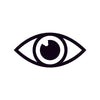WHAT ARE CATARACTS?
A cataract is a clouding of the eye’s natural lens and is most common in elderly people. When you suspect that you might have cataracts, you can ask yourself a couple of questions which will assist you to identify cataract symptoms:
- Are my eyes looking a bit yellowish or brownish?
- Are my eyes sensitive to light (lamp, car headlights, sunlight, etc)?
- Am I troubled by glare during the day?
- Is my vision becoming cloudy or filmy even though my glasses are still new?
- Is my vision worse at night? Am I trying to avoid driving at night?
- Do I feel like I need stronger/weaker glasses?
- Do I have double vision?
- Do I see colours not as vibrant as they used to be?
If you answer ‘yes’ to any of the above, you should inform your optometrist during your next eye test or organise to have an eye test soon.
Persons around the ages of 50 and 60 may have been told that there's a little bit of aging’ in their eyes. Many of them do not require immediate cataract surgery and their optometrist may offer bit of suggestions to slow down the progression, for example:
-
Dietary intakes of vitamin E (sunflower seeds, almonds, spinach), lutein and zeaxanthin (spinach, kale, green and leafy veggies)
-
Antioxidant vitamins e.g. vitamin C
-
Omega-3 fatty acids (fish and fish oil)


